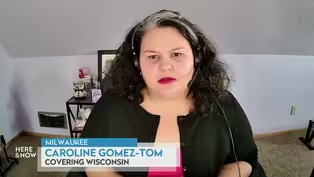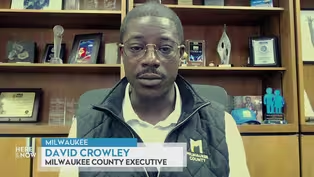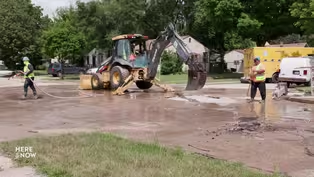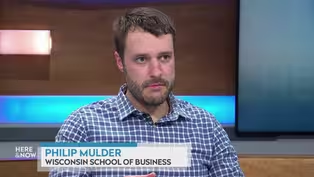Here and Now
Milwaukee Public Schools Confronts Dangerous Lead Problem
Clip: Season 2400 Episode 2406 | 5m 41sVideo has Closed Captions
Milwaukee Public Schools continues to clean up a widespread lead contamination problem
As a new school year begins, Milwaukee Public Schools continues efforts to clean up a widespread lead contamination problem in its numerous older buildings and continue to test students for poisoning.
Problems playing video? | Closed Captioning Feedback
Problems playing video? | Closed Captioning Feedback
Here and Now is a local public television program presented by PBS Wisconsin
Here and Now
Milwaukee Public Schools Confronts Dangerous Lead Problem
Clip: Season 2400 Episode 2406 | 5m 41sVideo has Closed Captions
As a new school year begins, Milwaukee Public Schools continues efforts to clean up a widespread lead contamination problem in its numerous older buildings and continue to test students for poisoning.
Problems playing video? | Closed Captioning Feedback
How to Watch Here and Now
Here and Now is available to stream on pbs.org and the free PBS App, available on iPhone, Apple TV, Android TV, Android smartphones, Amazon Fire TV, Amazon Fire Tablet, Roku, Samsung Smart TV, and Vizio.
Providing Support for PBS.org
Learn Moreabout PBS online sponsorshipthank you.
Thank you so much for the information.
>> Thank you.
It was my pleasure.
quickly approaches, we have an update on lead contamination in Milwaukee Public Schools.
Here and now, reporter Steven Potter has this report.
>> So they'll come back before school starts and make sure that they get every single spot.
And it's just a constant upkeep.
>> Brenda Cassellius is the superintendent of the system.
Since her first day in the job, less than six months ago, she's faced the manage a significant health risk facing the school district's more than 60,000 students.
The problem is lead contamination, specifically chipping lead paint and lead dust, and the extent of the problem is very widespread.
>> So we have to assume that the schools built prior to 1950, when there was the understanding that there's lead in paint happened, that those schools have lead in them.
>> Cassellius says the Milwaukee public Schools were using lead paint until it was federally outlawed in 1978.
That means a majority of schools are considered contaminated.
>> That's about 106 schools.
>> The lead crisis began when a student at the Golda Meir Elementary School tested positive for lead poisoning back in January.
That's when the City of Milwaukee Health Department got involved.
>> We're very concerned about developmental delays and cognitive regulation.
So if a child has significant lead poisoning, it can cause behavioral issues and make their more impulsive, and it can cause permanent brain damage that has significant long term effects.
So this is why lead is regulated at the federal level and why we're taking this so seriously here in the city.
>> Early last spring, after another NPS child tested positive for lead poisoning, the health department ordered the school district to come up with a lead abatement and management plan to address the most contaminated schools and the student populations most in danger of lead poisoning.
>> The district was required to produce a lead plan to ensure that we could get back to compliance with the lead standards that are set forth for any school across the state of Wisconsin.
>> Around 600 students have been tested, Totoraitis says, and the testing of students continues.
>> This is an ongoing effort that's really going to span into the coming years to ensure that we keep eyes on the students at Mnps and frankly, across the city.
>> Part of the school district's new plan, released last April, included temporarily closing several schools and relocating the students to another school while cleaning and repainting was done over the spring and now through summer.
School officials say they've made progress, but still have dozens more schools to clear.
>> We're hoping that we'll have our schools finished and tested by the September 2nd school start date.
>> It's a fluid process, so as we do our screenings and ensuring that the schools are ready to reopen, we've uncovered, hey, you actually need to reclean this room or you need to restabilize this surface and that adds more time.
>> Despite all of their efforts so far, NPS officials say that there's still a lot more work to do with cleaning and painting the schools to get them to a standard that's safe for students.
And once the schools are stabilized, additional maintenance and needed to keep them that way.
going to cost somewhere around $25 million to do.
And then there's the ongoing costs.
So we put an additional $16 million of ongoing investments within our facilities department to add custodial support, to add painters, to add plasters, to add lead abatement.
Or lead inspectors to the team to make sure that we're keeping up with our lead action plan.
NPS is having to cover alone.
>> We have not received any help from the state.
>> Still, some are concerned that not enough is being done fast enough or thoroughly enough to keep their kids safe.
And one group wants more transparency about what's being done.
Shannon Pahlicek is a parent with Lead Safe Schools Milwaukee.
>> It shouldn't have been a problem in the first place.
It's an issue of aging.
Buildings is a big part of it, but it's also an issue of deferred maintenance, which is a multifaceted problem.
The administration's job is to know what's going on in the schools.
And so the idea that there was, you know, as much degradation in the paint as there was and as much dust in the schools as there was, I think that's that's disheartening.
No child deserves to be unsafe on day one.
So they've got to do what they've got to do.
But the faster the better.
But you want it done right.
Cassellius says she understands the parents concerns.
>> We're working as fast as we can with all urgency and no expense spared.
So I've told my team, if you need additional painters, we will buy them.
If you need additional plasters, we will buy them.
The only thing that I can't give them more of is time.
We are up against a deadline on September 2nd to get this work done.
>> You can't make a mistake like this and then ask the public to just trust you.
You have to be willing to build that trust by being completely transparent.
>> Regardless of how much cleaning and repainting is done.
One fact remains that these schools still have decades of lead paint inside them.
So the only way to truly eliminate this risk, NPS officials say, is to rebuild.
>> I think that we need to do some either major renovations or new builds, and we need a significant 100 year plan in Milwaukee, public schools.
We have to make some hard decisions as a community about the investments we want to make in our children's future.
>> Reporting from Milwaukee.
>> Reporting from Milwaukee.
Caroline Gomez-Tom on ACA Health Plan Price Hikes For 2026
Video has Closed Captions
Clip: S2400 Ep2406 | 5m 24s | Caroline Gomez-Tom on projected increases in ACA premiums and expiring tax credits. (5m 24s)
County Exec. David Crowley on Milwaukee's Historic Flooding
Video has Closed Captions
Clip: S2400 Ep2406 | 5m 16s | David Crowley on recovering from extreme rain and damaging floods in the Milwaukee area. (5m 16s)
Here & Now opening for August 15, 2025
Video has Closed Captions
Clip: S2400 Ep2406 | 1m 3s | The introduction to the August 15, 2025 episode of Here & Now. (1m 3s)
Milwaukee Moves to Recovery After Record-Breaking Flooding
Video has Closed Captions
Clip: S2400 Ep2406 | 1m 55s | Milwaukee residents affected by historic rainfall and flooding pick up the pieces. (1m 55s)
Philip Mulder on Flood Insurance Coverage Around Wisconsin
Video has Closed Captions
Clip: S2400 Ep2406 | 6m 58s | Philip Mulder on the reasons why very few homeowners in Wisconsin hold flood insurance. (6m 58s)
Providing Support for PBS.org
Learn Moreabout PBS online sponsorship
- News and Public Affairs

Top journalists deliver compelling original analysis of the hour's headlines.

- News and Public Affairs

FRONTLINE is investigative journalism that questions, explains and changes our world.












Support for PBS provided by:
Here and Now is a local public television program presented by PBS Wisconsin




